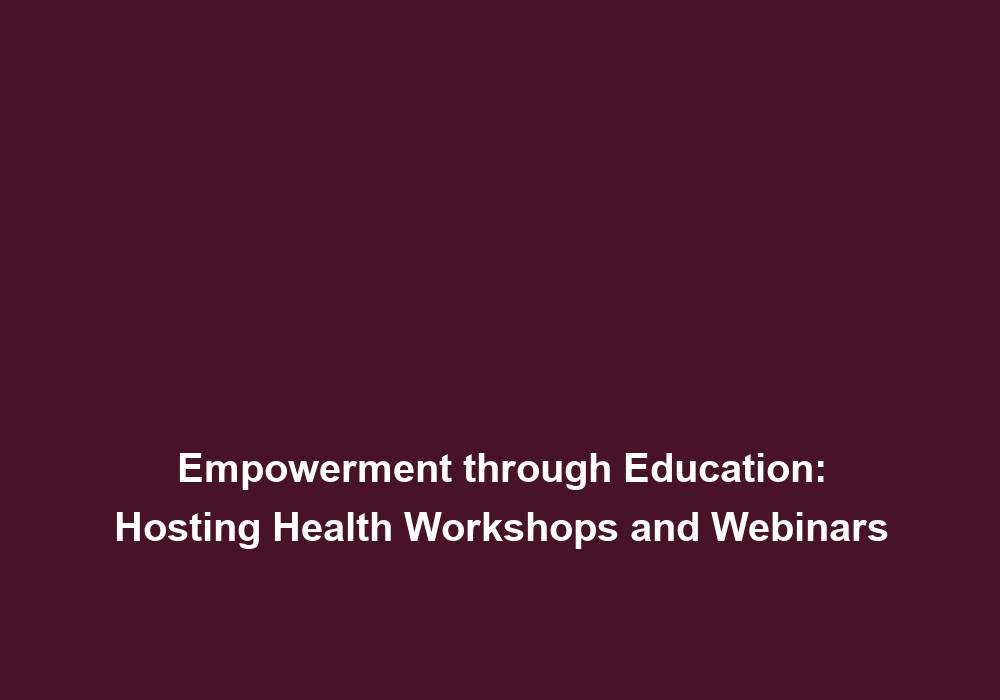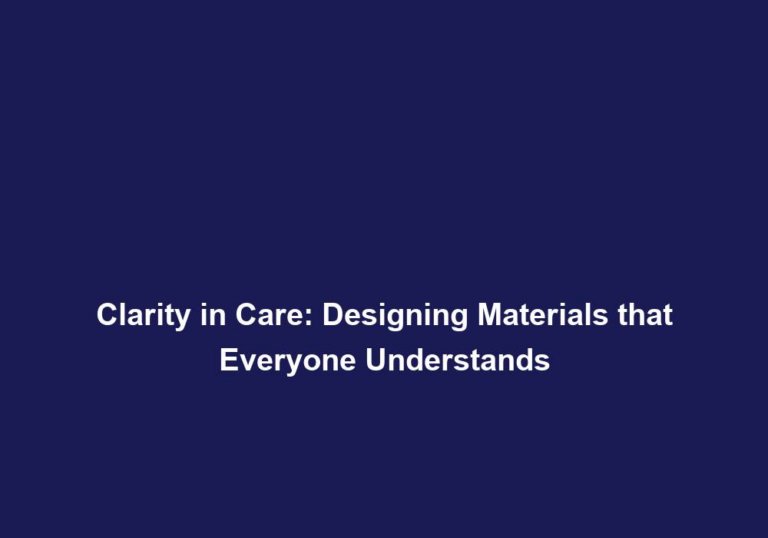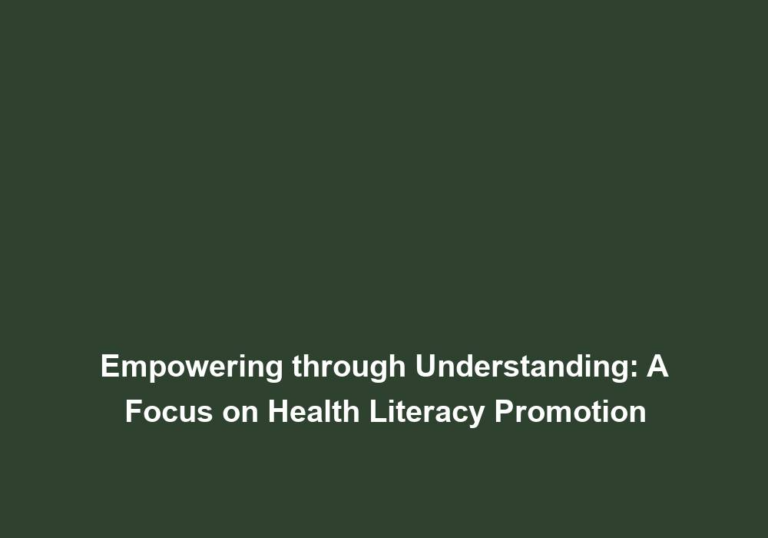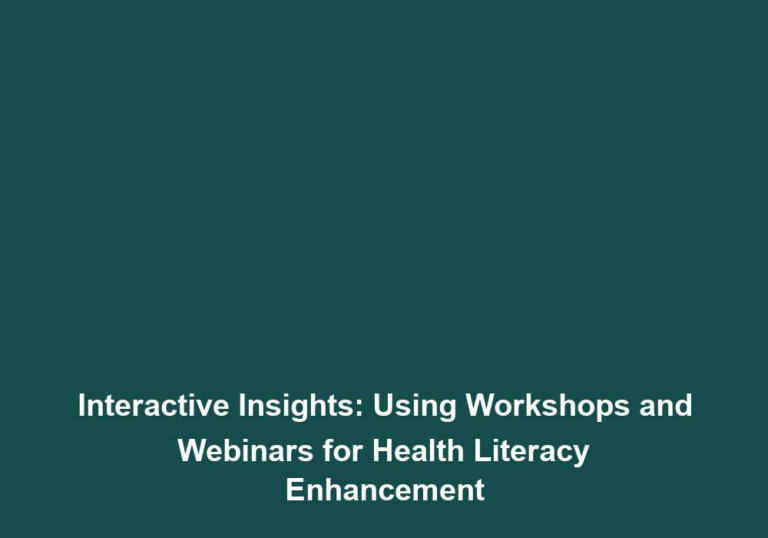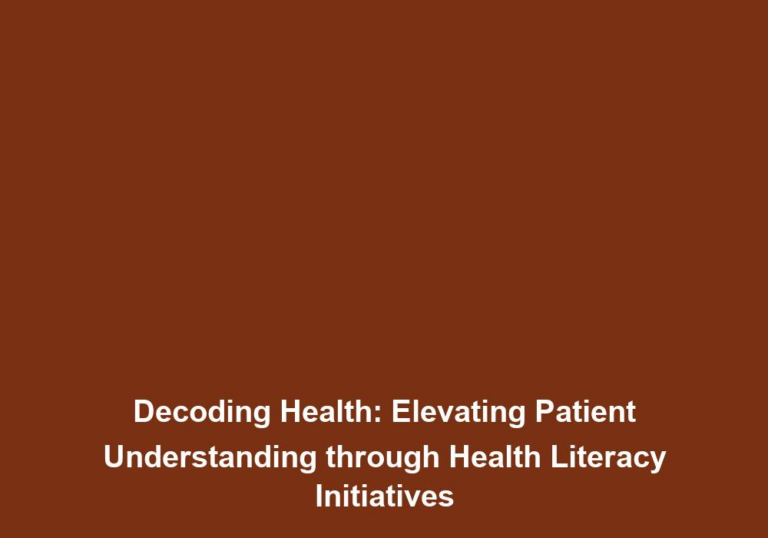Empowerment through Education: Hosting Health Workshops and Webinars
In today’s fast-paced world, where information is readily available at our fingertips, it is crucial to empower individuals with the knowledge and skills they need to make informed decisions about their health. One powerful way to achieve this is by hosting health workshops and webinars, which provide an interactive platform for sharing information, promoting discussion, and fostering empowerment through education.
Why Host Health Workshops and Webinars?
1. Creating Awareness
Health workshops and webinars serve as a medium to create awareness among individuals about various health-related topics. By organizing these events, you can shed light on prevalent health issues, potential risks, preventive measures, and available resources.
- During health workshops and webinars, you can address topics such as the importance of regular check-ups, the dangers of smoking, the benefits of exercise, and the impact of nutrition on overall health.
- By disseminating accurate information and presenting real-life examples, you can empower participants to take proactive measures for their well-being.
- Additionally, you can provide resources such as brochures, websites, and contact information for organizations that specialize in specific health concerns.
2. Sharing Expertise
Health workshops and webinars provide an opportunity to invite experts and professionals from the healthcare field as speakers or presenters. Their insights and expertise can be invaluable in educating attendees about the latest research, advancements, and best practices in various health domains.
- Experts can present case studies, share success stories, and provide evidence-based information to help attendees understand complex health issues.
- By sharing their knowledge and experiences, these experts contribute to the overall empowerment of the audience.
- They can also address common misconceptions, debunk myths, and provide practical advice on managing specific health conditions.
3. Promoting Healthy Lifestyle Choices
Hosting health workshops and webinars allows you to promote healthy lifestyle choices among participants. For instance, you can organize sessions on nutrition, exercise, stress management, and mental health.
- During these sessions, you can provide practical tips, strategies, and resources to enable attendees to make positive changes and adopt healthier habits.
- You can discuss the benefits of a balanced diet, the importance of regular physical activity, and techniques for reducing stress.
- By highlighting the impact of lifestyle choices on overall well-being, you empower individuals to take control of their health and make informed decisions.
4. Facilitating Discussion and Engagement
Interactive workshops and webinars encourage active participation and engagement. They provide a platform for attendees to ask questions, seek clarification, and share their experiences or concerns.
- Participants can engage in discussions about specific health topics, exchange ideas, and learn from one another.
- By fostering a supportive environment, you create a space where individuals feel empowered to voice their opinions and contribute to the conversation.
- This interaction not only enhances the learning experience but also builds a sense of community and support among participants.
Tips for Hosting Successful Health Workshops and Webinars
1. Define Objectives and Target Audience
Clearly define the objectives of your workshop or webinar. Are you aiming to provide general health education or focus on a specific topic? Identifying your target audience will help tailor your content and approach accordingly.
- Consider the demographics, interests, and knowledge level of your target audience when designing the workshop or webinar.
- This will ensure that the content is relevant, engaging, and meets the specific needs of the participants.
- For example, if your target audience is older adults, you may want to focus on topics such as healthy aging, managing chronic conditions, and fall prevention.
2. Plan Engaging Content
Develop an outline for your workshop or webinar that includes relevant topics, subtopics, and key points. Ensure that the content is educational, informative, and engaging.
- Structure the content in a logical flow, starting with an introduction and overview of the topic.
- Incorporate practical examples, case studies, and visuals to enhance understanding and retention.
- Break down complex concepts into digestible chunks and provide clear explanations to avoid overwhelming participants.
3. Engage Expert Speakers
Invite subject matter experts to speak at your event. Collaborating with professionals in the healthcare field will add credibility to your workshop or webinar.
- Research and identify experts who have a deep understanding of the topic and can effectively communicate with the audience.
- Ensure that the speakers are knowledgeable, experienced, and able to present information in an engaging manner.
- Provide the speakers with an overview of the objectives, target audience, and key points to ensure they align their presentations accordingly.
4. Utilize Interactive Tools
Incorporate interactive elements into your workshop or webinar to encourage active participation. Use polls, quizzes, and Q&A sessions to gauge attendees’ understanding and address their queries.
- Polls and quizzes can be used to assess participants’ knowledge before and after the event, allowing you to measure the impact of the education provided.
- Q&A sessions provide an opportunity for participants to seek clarification on specific topics and address any concerns they may have.
- Additionally, provide handouts, resource guides, or links to further information for participants to refer to after the event, enabling them to continue their learning journey.
5. Promote Your Event
Effectively promote your health workshop or webinar to ensure maximum attendance. Utilize social media platforms, email marketing, and online communities to spread the word.
- Create visually appealing graphics and engaging captions to capture the attention of potential participants.
- Collaborate with relevant organizations or influencers in the health sector to reach a wider audience.
- Offer early bird discounts or incentives to encourage early registration and generate buzz around the event.
6. Provide Post-Event Support
Offer post-event support to participants by sharing recorded sessions, presentation slides, and additional resources.
- This allows attendees to revisit the content, reinforce their knowledge, and access information they may have missed during the live event.
- Consider creating an online platform or community where participants can continue the discussion, ask questions, and receive ongoing support.
- Regularly update the platform with relevant articles, videos, and resources to keep participants engaged and informed.
Benefits of Empowering Individuals through Education
1. Improved Health Literacy
By hosting health workshops and webinars, you contribute to improving health literacy within your community.
- Health literacy refers to an individual’s ability to access, understand, and utilize health-related information to make informed decisions.
- Empowering individuals with the necessary knowledge and skills enhances their ability to navigate healthcare systems and take control of their health.
- Increased health literacy leads to better health outcomes, reduced healthcare costs, and improved patient-provider communication.
2. Enhanced Disease Prevention
Educating individuals about disease prevention strategies is crucial in reducing the burden of preventable illnesses.
- Health workshops and webinars can focus on topics such as vaccination, early detection, and lifestyle modifications to prevent chronic diseases.
- By empowering individuals with this knowledge, you enable them to make proactive choices that promote their well-being.
- Prevention is always better than cure, and by emphasizing the importance of preventive measures, you can significantly impact the health of your community.
3. Increased Self-Advocacy
Education empowers individuals to become active participants in their healthcare journey.
- By equipping them with knowledge about their rights, available resources, and treatment options, you encourage self-advocacy.
- Empowered individuals are more likely to ask questions, seek second opinions, and actively participate in their healthcare decisions.
- This level of engagement leads to better healthcare experiences and outcomes for individuals, as well as a more patient-centered healthcare system.
4. Strengthened Community Support
Health workshops and webinars not only benefit individuals but also foster a sense of community support.
- By providing a platform for individuals to come together, share experiences, and support one another, you create a network of individuals with a shared interest in health.
- This sense of community promotes collective empowerment and can lead to positive changes at a broader level.
- Participants may form support groups, engage in advocacy efforts, or collaborate on community health initiatives, creating a ripple effect of empowerment and improved health outcomes.
In conclusion, hosting health workshops and webinars is a powerful way to empower individuals through education. These events create awareness, share expertise, promote healthy lifestyle choices, and facilitate engaging discussions. By following the tips provided and recognizing the benefits of empowering individuals through education, you can make a significant impact on the health and well-being of your community.

